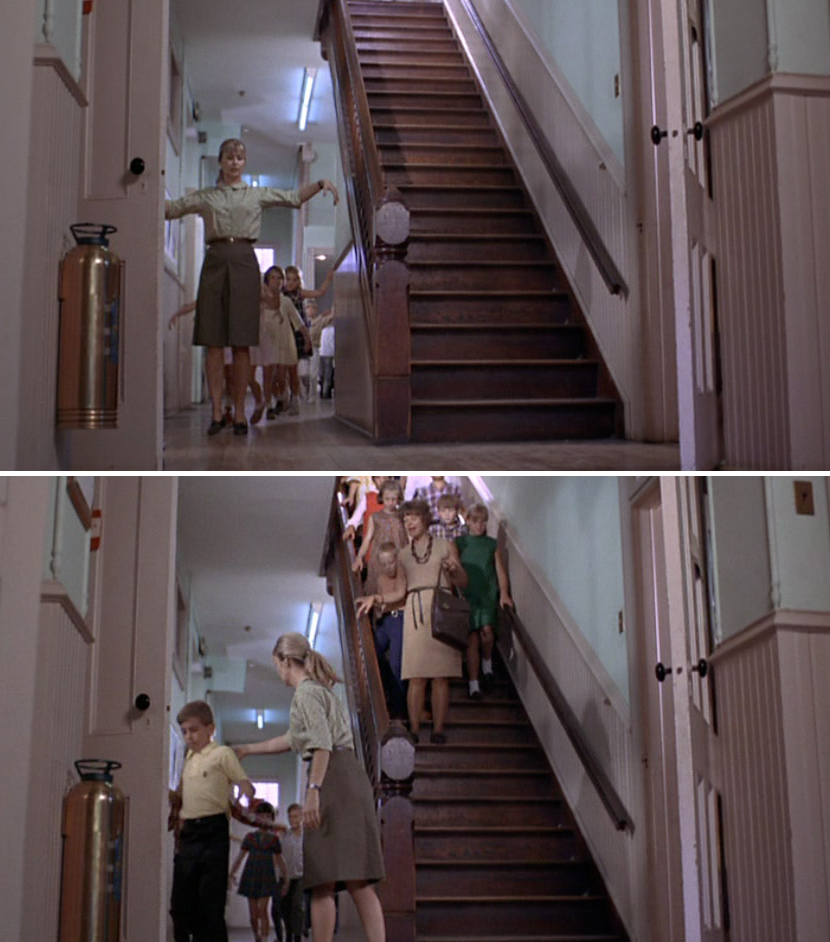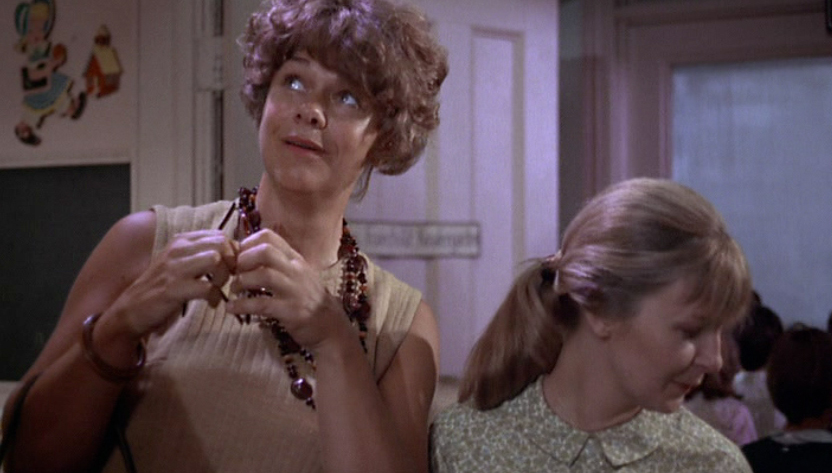I've hinted at it before but we're going to try "Introducing..." as a series, since we love contemplating how actors and filmmakers introduce us to key characters in the movies. There's a real specific art to it if you want the character to stick. So herewith, as prelude to Wednesday's Smackdown, is how the five Supporting Actress nominees of 1968 are introduced in their films. In future non-Smackdown episodes we'll just concentrate on one entrance. But for our purposes here, quintuplets!
I've listed the nominees by how soon they show up in their respective films.

8 minutes in... Estelle Parsons as "Calla" in Rachel Rachel
This entrance is smartly staged by first-time director Paul Newman. It has the clarity of a theatrical entrance albeit without any heightening or glamour. As Rachel (Joanne Woodard) leads her schoolchildren downstage right with some silly arm wavings, an atypically 'light' gesture from this uptight teacher, Calla descends stage left from a higher floor into view, with her own flock, as if conjured by that sudden shift in tone. You immediately sense that they're very different women but as Calla gets closer to the camera, her shift from screechy schoolmarm to close co-worker chum is complete; the women lean in together co-conspiratorially.

Calla: Miss Cameron -- just a minute, get in line -- we're off to the library to look at castles and keeps. What are you off to?
Rachel: We're going to be fairies and butterflies.
Calla: Ooh.
Fairies is right at least.

If a girl isn't what?"
12 minutes in... Kay Medford as "Rose Brice" in Funny Girl
(7 minutes if you cut the visual-free overture)
Kay's first annoyed line to a friend stepping out of line, kicks off the musical's first song. It's quite surprisingly, Streisand free. Mrs. Brice's kvetching friends start "If A Girl Isn't Pretty" on a funny bitchy note but this Mama Rose is supportive of her daughter and defends her worth at the end of the unfinished song.
So she looks a bit off balance... she possesses major talents."

What do you want? If you're a selling something, we don't want any."
15 minutes in... Sondra Locke as "Mick" in The Heart is a Lonely Hunter
We spend the lengthy pre-credits prologue focused on John Singer (Alan Arkin), a deaf-mute, but when he moves towns during the opening titles, he seeks out a room for rent. He is greeted, not warmly, by restless teenager Mick. When she sees his card "I am a deaf mute" her face freezes. The movie was all about John Singer but the shift is so abrupt to closeups of Locke that it practically forgets about the man at the door. We have to recalibrate whose story this is, while Mick recalibrates how to handle the strange man. Even after reading the card she's unkind to him but perhaps she'll come around*
*I loved this novel when I read it years and years ago but I don't remember the plot at all!


That's not possible. That's a mistake."
17 minutes in... Ruth Gordon as "Minnie" in Rosemary's Baby
Roman Polanski sure knows how to direct these perverse thrillers. We hear Minnie long before we see her through the walls of her new tenant's apartment and the Castevets names are dropped several times before they're finally walking down the sidewalk in longshot with her husband Roman, in garish wardrobe. But how perfect that she seems so tiny in the frame when her reach is so expansive on that street and in every secret doorway in that apartment building and the Castavets loom so large in the film. The cops inform her that her tenant has committed suicide which she disbelieves... at least vocally... before marching straight to the body to inspect for herself.

22 minutes in... Lynn Carlin as "Maria Frost" in Faces
Maria has a very slow burn character arc and Faces takes its time bringing her into focus, even though she's arguably the film's leading lady. When we first meet her, we see only her hand and the back of her head as she talks on the phone in a series of "yeahs and "uh-huhs" as she watches her husband returning home outside the window.
The most haunting thing about her entrance, which is filled with mundane chatter and frequent peels of laughter, isn't in the introduction scene at all. It's the (intentional?) foreshadowing in the previous scene. It ends, angrily, on the line "You're on your own again." Cut to: Maria. She's about to be.

Did you sit up and take notice when these women entered or were you all about their co-stars?